Graham Reid | | 7 min read
Al Green: I Can't Stop
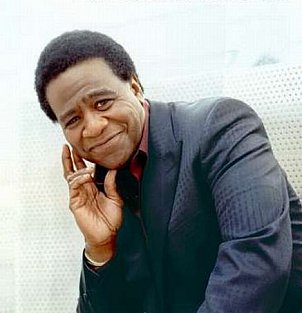
In Memphis, a few kilometres south of
Graceland is a small church in Hale Rd, a sidestreet off Highway 51
also known as Elvis Presley Boulevard. Not many music lovers make it
this far; they are waylaid by the fridge magnets, postcards and
facsimile of Elvis' drivers licence further back up the highway, or
are taking the tour around the room in town that is Sun Studios where
Presley, Johnny Cash, Jerry Lee Lewis, Roy Orbison and a dozen others
recorded.
But in the Full Gospel Tabernacle for
the 11am Sunday service a few tourists are peppered among the
parishioners.
This is a black church, full of the
healing message, but that's not why people come from Germany,
Australia, Canada and New Zealand. They are here to hear the preacher
sing.
The man at the pulpit is Al Green, the
sweet soul singer who cut those legendary songs Tired of Being Alone,
Let's Stay Together, Take Me to the River (the title of his
autobiography, and famously covered by Talking Heads) and I'm Still
In Love With You.
Every Sunday the Rev Al Green preaches
salvation and raises his voice in worship. It is a sound that touches
the soul, whether he is singing religious or secular songs.
Of course Green has rarely sung secular
songs, but last year again teamed with the producer of all his great
hits, Willie Mitchell, the man who discovered him in 1970.
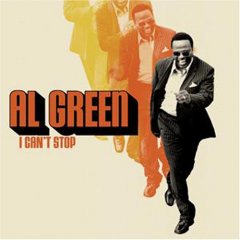 The result is I Can't Stop, a
collection which also pulled in many of the original musicians from
those classic recordings in Mitchell's Royal Studios in their
hometown Memphis. At its best it conjures up the same spirit before
he abandoned commercial pop for the church.
The result is I Can't Stop, a
collection which also pulled in many of the original musicians from
those classic recordings in Mitchell's Royal Studios in their
hometown Memphis. At its best it conjures up the same spirit before
he abandoned commercial pop for the church.
Green's departure from pop came through
two signs from his God. In 1973 with a string of hits behind him and
a reputation for possessing the most seductive voice in soul-pop,
Green had a visitation from the Holy Spirit in a Disneyland motel. He
vowed to extract himself from the secular world and devote himself
anew to the faith he was brought up in but had abandoned for the life
of money, sex and good times.
But it took another more dramatic sign
for him to change. The following year a jealous lover poured a pot of
boiling grits over him as he sat in a bath, then shot herself in
front of him.
Green suffered third degree burns and
during his eight-month recovery began reading the Bible. He learned a
man could not serve two masters, so turned his back on pop-soul and
entered the church. In subsequent years he recorded gospel albums.
Now 58, Green is in excellent good
humour - and looking like a man two decades his junior - as he
relaxes in a Los Angeles hotel room.
He's in the city of angels to promote I
Can't Stop, and although it isn't too far from his classic sound,
which he is happy to discuss, his faith is never far away either.
Oh yes, he knows those tourists who
come to his church aren't there for the sermon, he says with a hoarse
laugh which belies the smoothness of his singing voice. But if
there's an outside chance that just one in 100 gets the message of
the amazing grace, then that's the pay-off.
"The grace says if you can repent
a thing and make up your mind you won't do that no more, that is the
grace, to be free from all guilt. If I go to heaven and can take 10
people out of my whole lifetime, it would have been worth it to me."
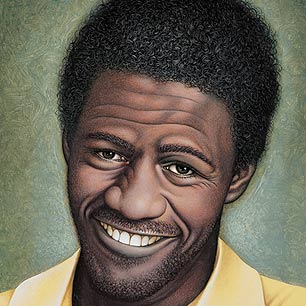 And yes, Green could have turned his
faith into a cash-cow, milking tourists for their money, getting a
bigger church for his parishioners by using his profile. But some
Sundays he doesn't even ask for money in the collection plate and
he's happy with a small congregation of the faithful.
And yes, Green could have turned his
faith into a cash-cow, milking tourists for their money, getting a
bigger church for his parishioners by using his profile. But some
Sundays he doesn't even ask for money in the collection plate and
he's happy with a small congregation of the faithful.
"I wasn't doing it to be wealthy
in material things. You are trying to get closer to your natural self
by saying, 'I don't need that but I do need a bit more of the
Messiah, of Jesus'.
"If I can live in his word then I
can stand in the grace of God. But material things like a house or
car? You didn't come here with it and you can't take it with you, so
we didn't get into church to get rich, we got in to be fishermen and
fishing for men. That's right."
A feature of Green's rhythmical speech
and charming southern accent is how he repeatedly refers to himself
in the third person - whether it be when speaking of his ministry or
recording his new album - and the punctuation, "That's right"
to reinforce a point. He's ever the preacher.
He laughs frequently, at one point
sings Aretha Franklin's You Make Me Feel Like A Natural Woman when
saying there are too few gospel-inspired soul singers stepping up to
take the place of Marvin Gaye, Otis Redding and Franklin, and
acknowledges the reason for a secular album now - after Mitchell had
been at him for 15 years to do another - was because the producer had
lost his wife of 53 years to cancer and was unwell himself.
But when the singer turned up intending
to quickly knock off an album of covers, Mitchell insisted he write
new material. Together they sat at the piano just like in the old
days and wrote lyrics which were sensual "and seductive".
"Well yes, I just said it so I
have to admit it, they are seductive. My wife would say, 'Do you have
to be so explicit?'."
And I'd say, "Shh, if you just be
quiet won't nobody know but us."
The album is full of classic Green -
the high end of his distinctive voice sounds undiminished - but while
tracks such as the magical five-and-a-half-minute My Problem is You
and the languid Rainin' in my Heart touch timeless places, the album
is a hit shy of a killer punch.
But it was not a foregone conclusion
that when the album was finished they'd just flick it out. Green's is
a conservative congregation, so he had to persuade them that after 27
years as their preacher a secular album was alright.
 He invited his mother to the studio
knowing that if he could win her - "She's completely church and
is on the mothers' Board" - he could win the rest.
He invited his mother to the studio
knowing that if he could win her - "She's completely church and
is on the mothers' Board" - he could win the rest.
"Willie got choked up because Al
had never brought his mom to hear nothing in 30 years. So he knew it
was special for me to bring her. My momma's 83 and as she was going
down the steps outside she said, 'Al, that's really nice'.
"When she said that, in my heart I
said: 'Yes!' I knew if she liked it then the others would come
around.
"The mothers said, 'Al, we heard
all the songs, and if you really mean 'I love you' then you got to
put the CD out, but if you don't mean it and backslide, then it's not
worth putting out' ."
Al the soul singer also had to win over
the Rev Al. In his autobiography he said the Al Green onstage bears
no resemblance to the Al Green in the pulpit. "Most of the time
they can't even stand living in the same skin".
Today he has reconciled his two selves.
"I've come to understand one can't live without the other.
You've got a body and then there's the spirit, God did the right
thing, he put them together and the body needs the soul and the soul
needs the body. We have to reconcile our actions and our work only to
the man upstairs."
In these troubled times it seems worth
asking the Reverend if he has a message for the world. It's not a
mistake, but a man used to commanding a congregation doesn't work in
soundbites. He embarks on a rambling monologue which, distilled, says
he believes the literal truth of the King James Bible, that we
shouldn't be troubled by the Saddams and bin Ladens, or that children
are set against parents and parents against children. The book is
true, so don't let your heart be troubled, believe in God and know
that we are in the last days.
"I believe we need to be prepared.
You and I are saved by grace and faith, two cornerstones of our
belief in God. The grace of God and then faith in Christ to be our
reconciliation to God is gonna make all the difference in the world
to us. We can live through our faith in his word and the grace of God
applied to us."
He's on a roll but then, not abruptly
but as if realising he should be Soulman Al not Preacher Al, halts
himself, laughs once more and says with heartfelt warmth, "Love
you, man. Tell the New Zealanders I love them all, too."

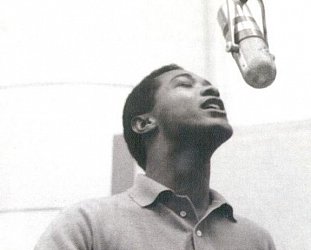

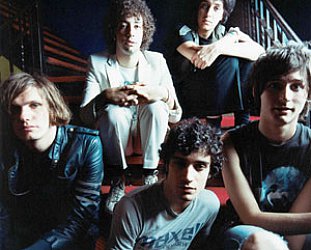


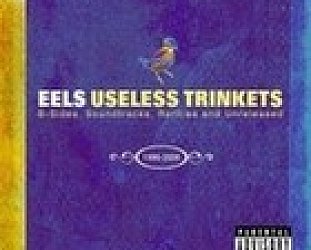
post a comment